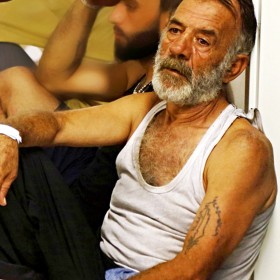Moussa’s Story, Central African Republic

72-year-old Moussa sits at an abandoned classroom at the Nasredin site. Photo by A. Kitidi/2014.
In a country where the life expectancy is lower than 55 years, the memories of 72-year-old Moussa Abaka constitute a precious testimony of better times gone by. Working as a janitor at the cinema “Rex” in Bangui the capital of the Central African Republic, Moussa witnessed the “Banguissois” swarming in together to enjoy cowboy movies, hollywood love stories or Italian films. Moussa remembers a time “when we got along together well, discussed and ate at the same table.”
These experiences, though, now seem very distant for the elderly father of three, who sits in an abandoned classroom at the Nasredin site for the internally displaced. Surrounded by hundreds more displaced by the violence, Moussa deplores “the workings of politics that tore society apart.”
“I came to the site last February, due to the disorder,” he recounts. “I am a Muslim and the fear of the Anti-Balaka made me leave my home and sleep out in the open. I lost contact with my children, who finally found refuge in the city of Dekoa. The lack of money obliged me to cover the distance from my home to here on foot. Now, I live on handouts given by old acquaintances.”
While UNHCR and partners are working intensively to ameliorate living conditions at the site, Moussa says that he now feels lost. “I am sick, I do not sleep at night and I hardly recognize my life anymore,” he says exasperated. “I’m an old man, in need of assistance.”










